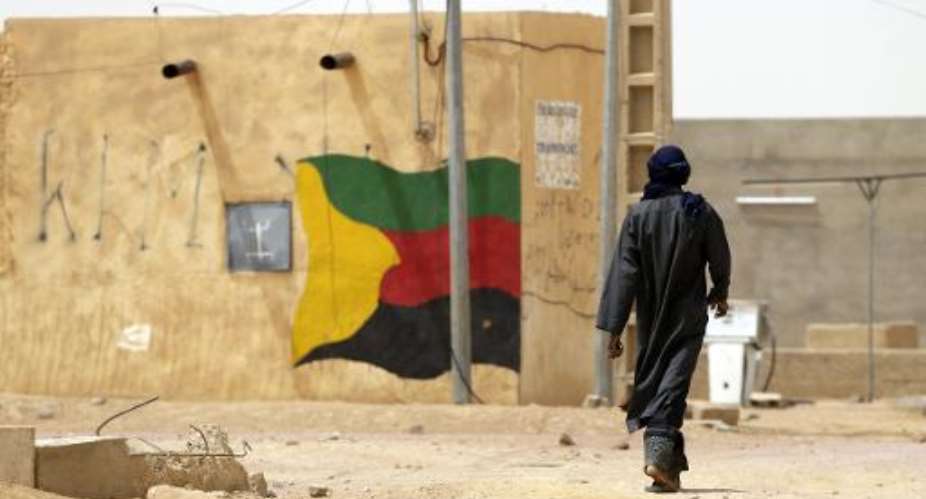Bamako (AFP) - Tuareg rebels in Mali gave back two state buildings Thursday that had become symbols of their separatist struggle, honouring the terms of a peace deal despite bitter protests from their own supporters.
After a nine-month occupation, the National Movement for the Liberation of Azawad (MNLA) evacuated the governor's offices and state TV and radio station in the northeastern town of Kidal, overriding Tuareg protesters who laid waste to the governorate and other public buildings in outrage.
"The rebels, in accordance with their commitments, returned the governor's office and radio station in Kidal," said Abdoulaye Bathily, second-in-command of the United Nations peacekeeping mission in Mali, who flew in to Kidal on Wednesday in a bid to smooth the handover.
He said MNLA leaders had gone through with the move after talks with protesting supporters holding a sit-in outside the governor's offices and the local TV and radio offices of state broadcaster ORTM.
The MNLA had pledged five days ago to return the buildings Thursday in line with the terms of a June peace deal for the troubled west African country, whose central government is struggling to restore control after a crisis that split the country in two.
But the decision deeply divided the MNLA, whose ultimate goal is the independence of Azawad -- the minority Tuaregs' name for their homeland in northern Mali.
Young Tuareg protesters set fire to part of the governor's offices and sacked the public treasury and a nearby state education facility, according to witnesses.
"I can see a governorate wall that has been torn down and I also saw the treasury go up in flames," one civil servant told AFP by phone.
The MNLA's vice president denied the protesters were angry with rebel leaders.
"The people are showing their anger with the Malian state and with a problem that has existed for 50 years, not with their leaders," Mahamadou Djeri Maiga told AFP.
"Everyone knows the Malian army's not welcome in Azawad," he said. "The people aren't safe. The army is committing abuses. How do you restore calm in circumstances like that?"
The June peace roadmap was also signed by another armed Tuareg force and the Malian government.
An African military source and a resident said an eminent Kidal tribal chief, Intalla Ag Attaher, had acted as mediator between supporters of the deal and the opposing camp, which argued that vacating the buildings would weaken the Tuareg push for autonomy.
According to Moussa Ag Acherif, who is close to Intalla Ag Attaher's family, the patriarch of Kidal urged MNLA rebels to leave the occupied buildings.
"The principal leaders of the MNLA were there when this demand was made," Ag Acherif said.
The June accord opened the way for a presidential election to be held in Kidal along with the rest of Mali, in two rounds in July and August.
Up until the agreement, the MNLA had refused to allow any government soldiers or civil servants into the desert town.
The election -- won by Ibrahim Boubacar Keita, who was sworn in as president in September -- was seen as a key step to restore stability in Mali.
The country descended into crisis in January 2012, when the MNLA launched the latest in a string of Tuareg insurgencies in the north.
A subsequent coup in the Malian capital Bamako led to chaos, and armed Islamist extremists linked to Al-Qaeda overpowered the Tuaregs to seize control of Mali's northern half.
A French-led military operation launched in January ousted the extremists, but sporadic attacks have continued, and the Tuareg demand for autonomy has not been resolved.





 We’ll protect state wealth from opaque deals – Prof Jane Naana
We’ll protect state wealth from opaque deals – Prof Jane Naana
 Mauritania president says running for second term in June polls
Mauritania president says running for second term in June polls
 I won't ever say I was a mere driver’s mate' — Prof. Opoku-Agyemang
I won't ever say I was a mere driver’s mate' — Prof. Opoku-Agyemang
 2024 polls: 'EC struggling to defend credibility'— Prof. Opoku-Agyemang
2024 polls: 'EC struggling to defend credibility'— Prof. Opoku-Agyemang
 Akufo-Addo gov't's 'greed, unbridled arrogance, unrestrained impunity, sheer dis...
Akufo-Addo gov't's 'greed, unbridled arrogance, unrestrained impunity, sheer dis...
 Election 2024: Ghana needs an urgent reset, a leadership that is inspiring – Ma...
Election 2024: Ghana needs an urgent reset, a leadership that is inspiring – Ma...
 Partner NDC to rollout a future of limitless prospects – Prof Jane Naana Opoku-A...
Partner NDC to rollout a future of limitless prospects – Prof Jane Naana Opoku-A...
 NPP will remain in gov’t till Jesus comes — Diana Asamoah
NPP will remain in gov’t till Jesus comes — Diana Asamoah
 Sunyani Technical University demands apology from former SRC president over sex-...
Sunyani Technical University demands apology from former SRC president over sex-...
 'Dumsor' was resolved by Mahama but ‘incompetent' Akufo-Addo has destroyed the g...
'Dumsor' was resolved by Mahama but ‘incompetent' Akufo-Addo has destroyed the g...
